Reviewers' Choice: Favorite Books of 2017

Did you know Foreword‘s editorial team gives every one of our reviewers carte blanche permission to kill a review if the reviewer can’t highly recommend the book to readers? It’s true—we refuse to waste valuable editorial space talking about books we don’t love. And we trust and respect our reviewers enough to pass final judgment. In fact, we pay them a kill fee.
In this season of reminiscence, we’re returning to one of our most popular blogs ever: Reviewers’ Choice, in which a handful of Foreword’s top reviewers recommend their favorite couple books of the year. This week and next, we’ll list ten books with some notes from the reviewers. Keep in mind that every year, Foreword Reviews publishes about a thousand reviews of new books from independent and university presses. So the ten books below, truly represent the one percent!
Seb lives in a cold, dark, northern fishing town that doesn’t see the sun all winter long so he, along with his walrus, get creative in their search for warmth and sunshine. I would nominate this book for a Caldecott Medal if I could. The shadows on the water and snow made me shiver with just the right amount of softly glowing moonlight and magic. —Pallas Gates McCorquodale
Seb and the Sun
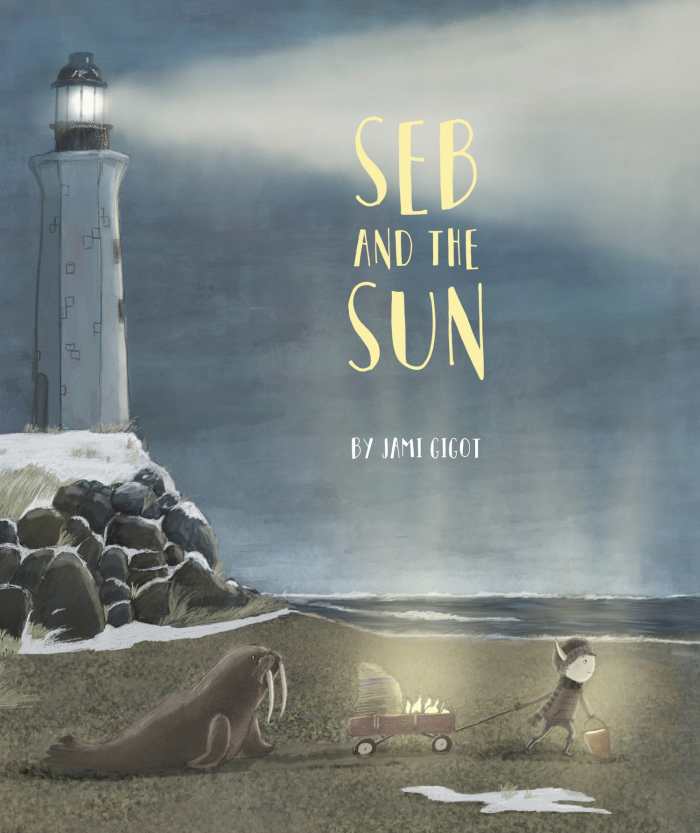
Jami Gigot
Ripple Grove Press
Hardcover $17.99 (36pp)
978-0-9990249-0-4
Buy: Local Bookstore (Bookshop), Amazon
Far to the north where winter chases the sun away and the days are dark and drab, Seb and his friend Walrus conspire to bring light and warmth to their snowy coastal town. Beautifully depicted scenes full of murky shadow and softly glowing lanterns give Seb’s home a stark and otherworldly quality, while his sense of adventure, penchant for crust-free sandwiches, and friendly walks along the beach and pier are sure to warm the heart.
PALLAS GATES MCCORQUODALE (December 11, 2017)
Charlie is a skateboard riding, lizard loving boy with wild hair who likes carrying his things in a bright red purse his grandma gave him. Not everyone thinks a boy should carry a purse though, but Charlie likes it and doesn’t mind the questions and comments about his handbag. What I love about this book is that it imparts an incredibly powerful, positive message about individuality without using labels or stereotypes. Charlie simply being Charlie inspires others to be themselves too, and the world is a happier place because of it. —Pallas Gates McCorquodale
I Love My Purse
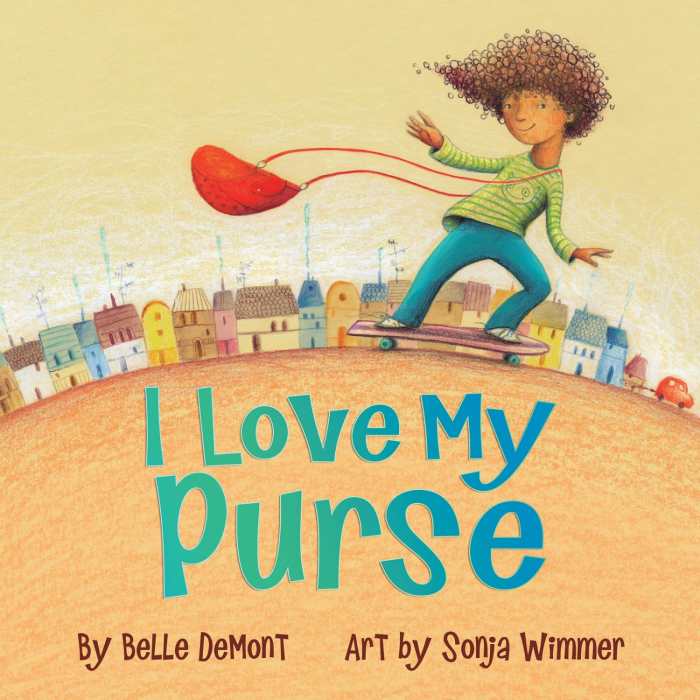
Belle DeMont
Sonja Wimmer, illustrator
Annick Press
Hardcover $18.95 (36pp)
978-1-55451-954-5
Buy: Local Bookstore (Bookshop), Amazon
Confidently rocking a bright red hand-me-down pocketbook, Charlie’s quiet courage shines in Belle DeMont’s delightfully inspiring I Love My Purse, a tribute to being unapologetically true to yourself and embracing individuality, be it through wearing an accessory traditionally meant for girls, eating the food you love, or openly pursuing your dreams. Colorful illustrations from Sonja Wimmer highlight cool Charlie’s quirky style as he cruises to and from school, skateboard and handbag in tow.
PALLAS GATES MCCORQUODALE (August 27, 2017)
When its lead is kidnapped by djinn, you think that this could be delectable, if typical, young adult fare. It’s nothing of the sort. Well-versed in ancient and Eastern mythology and clever as hell, it barrels through quirky djinn foibles and plots with twisted humor. It’s darkly magical in the best possible way. Can’t wait for the sequel. —Michelle Schingler
Djinn City
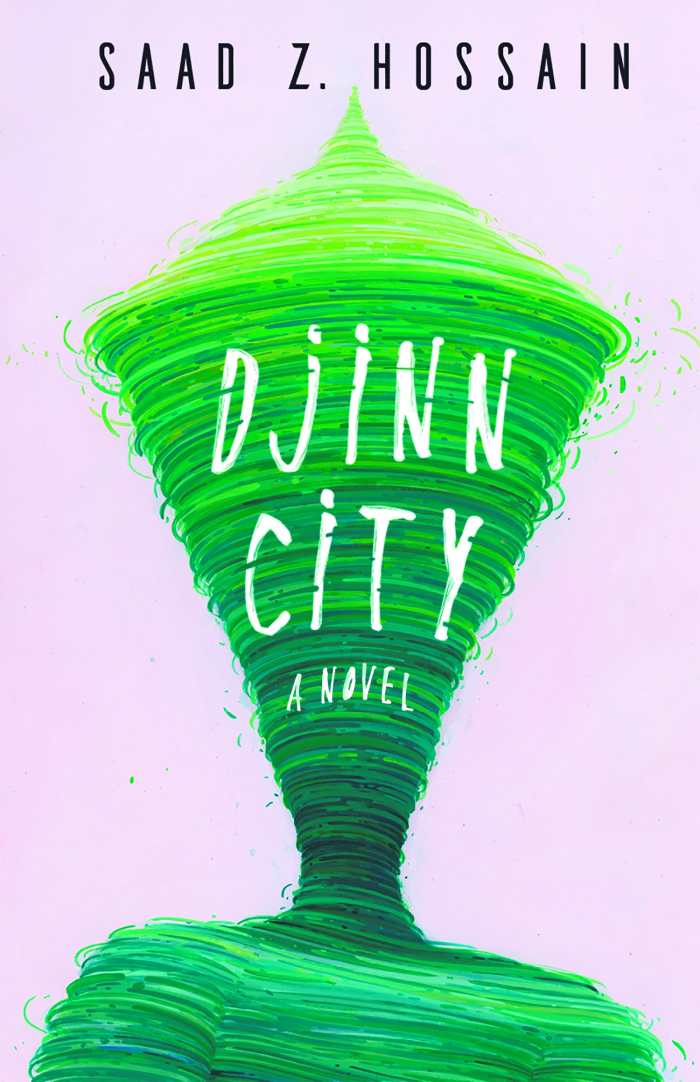
Saad Z. Hossain
The Unnamed Press
Softcover $17.99 (238pp)
978-1-944700-06-5
Buy: Local Bookstore (Bookshop), Amazon
Hossain’s story ripples with magic and just a dash of something twistedly angelic.
Whatever your level of familiarity with beings mythological and godlike, rest assured: you’ve never journeyed with djinn like these before! Saad Z. Hossain’s Djinn City is a wholly enchanting contemporary fantasy novel that takes cherished stories of fantastical beings and transforms them into something crisp, engrossing, and newly relevant.
A dilapidated home in bustling Bangladesh becomes the setting for events that threaten to undermine the known universe. The source of such possible disasters? A child, Indelbed, whose mother was a djinni, whose drunken father is … something else, and whose heritage those in djinn power find too dangerous not to repress.
With the knowledge of some in his human family, Indelbed is whisked away to a place where he’s less of a threat to the djinn. Presumed dead by most, he is in fact relegated to a pit. There, he learns hard truths and harnesses his own magic, thanks to an ancient and powerful fellow prisoner.
While most of the world seems content to continue on without Indelbed, his impetuous cousin, Rais, and his incomparable aunt, Juny, sense that something is amiss. Rais abandons his wild ways for something more steady: a search for the truth. It takes him into the heart of the ancient, aging djinn society, where beings are both more godlike and more human than he knew to expect. It takes him to the edges of reality, and to a portal for humanity’s possible unmaking.
Hossain’s story ripples with magic and just a dash of something twistedly angelic. It is populated by dragons in their most nascent forms, terrifying sea beasts, and flying machines; it is built up by fictionalized mythologies that weave their way through known origin stories and rumors, birthing something new and captivating. Its villains are complex and sometimes appealing; its heroes are delightfully flawed. Even its violent scenes have charm.
Humor and intrigue ferry Djinn City toward its thrilling end. Expect rapt audiences to spend a good while frantically rubbing lamps to wish for one thing only: the speedy release of its sequel.
MICHELLE ANNE SCHINGLER (October 25, 2017)
The Emerald Circus is a fairy tale lover’s dream with its engrossing twists on familiar stories and figures. Jane Yolen clearly revels in both her language and her subject matter, and it’s infectious. —Meagan Logsdon
The Emerald Circus
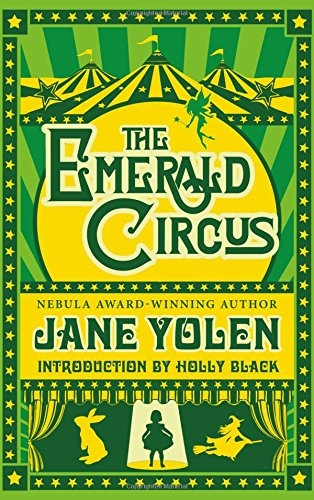
Jane Yolen
Tachyon Publications
Softcover $15.95 (288pp)
978-1-61696-273-9
Buy: Local Bookstore (Bookshop), Amazon
For lovers of literature, Arthuriana, and fairy tales, this is a treasure trove.
The Emerald Circus is a moving collection of stories that conveys timeless truths as it affectionately plays with traditional tales.
Jane Yolen’s latest collection is a wonderful menagerie of twists on classic fairy tales, legends, and the lives of literary figures. These stories parade beneath a circus tent knit by the underlying theme of the power of art.
Bookending the collection are two evocative yarns based on highly influential literary personalities. Hans Christian Anderson transcends his impoverished origins, encounters the real Snow Queen, and gains the admiration of children worldwide. Emily Dickinson is taken for a ride in an alien spaceship and discovers the connections that words can forge across differences. New reaches of beauty affect her poetry forever.
Between these stories, a vast range of legends and fairy tales are deftly reworked. Lancelot seeks the hidden grave of Guinevere. A group of Wendys stage a feminist revolt against Peter Pan and the Lost Boys. The tornado carries Dorothy away from Kansas to join the Emerald Circus, where she becomes a talented acrobat. The origin of Excalibur resides on a mysterious island of women swordsmiths. Alice, without a vorpal blade, faces the Jabberwocky. A dying monk relates the events surrounding the birth of Merlin. Every episode is delightfully fresh and full of poignant insight. For lovers of literature, Arthuriana, and fairy tales, this is a treasure trove.
The prose never fails to entrance, and the creativity on display impresses. There is an obvious depth of research and care, particularly evident in “The Jewel in the Toad Queen’s Crown,” a tale centering on Disraeli, the intriguing Jewish-turned-Anglican prime minister of Victoria’s England on two separate occasions. Notes in the back on each individual story offer a peek into the mind of the writer and give context for Yolen’s inspiration. These are interspersed with a few of her own poems, which are warm and inviting.
The Emerald Circus dances at the border between bucking tradition and paying homage to the great stories and figures of ages past. The result is a brilliant assemblage of narratives with the potential to leave an audience spellbound.
MEAGAN LOGSDON (October 25, 2017)
Who doesn’t love a good conspiracy theory? Well, usually religious folks—but that’s not true for ex-religion professor Oliver, who handles his personal crises by turning to the Hollow Earth theory and its aficionados. This novel is heartrending and brilliant as it deals with questions of faith, loss, and recovery. I recommended it to all of my old divinity school buddies, but it is absolutely an adventure for everyone. —Michelle Schingler
Hollow
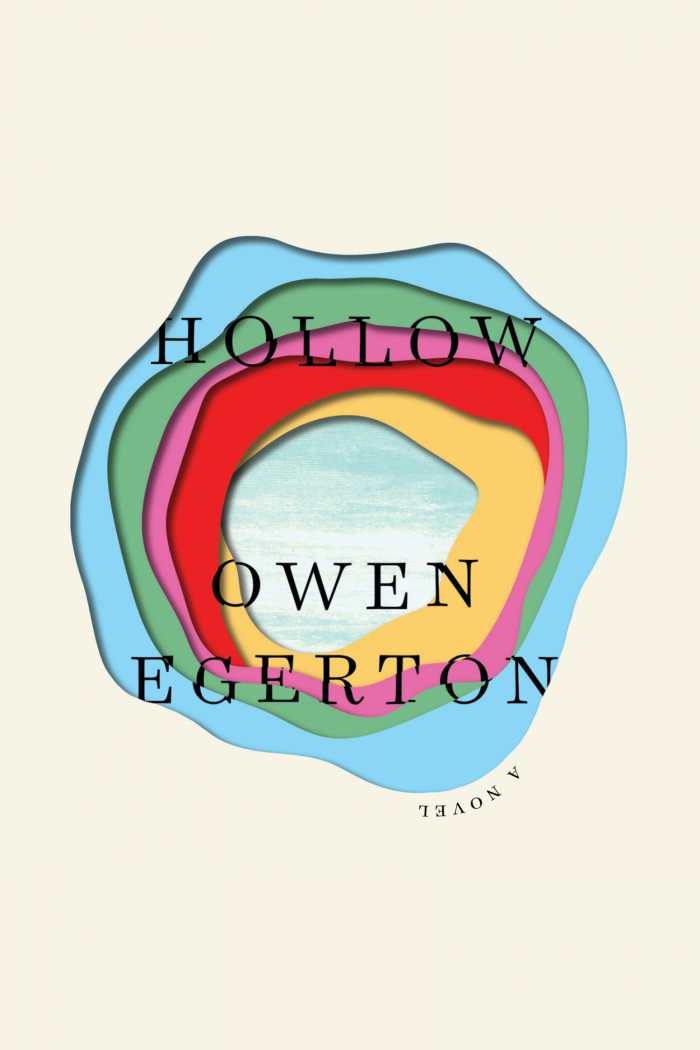
Owen Egerton
Soft Skull Press
Hardcover $25.00 (240pp)
978-1-61902-940-8
Buy: Amazon
Hollow is a work with an animate, vibrant, and awe-inducing core, in which untroubled faith is revealed to be a frequent foil.
While Owen Egerton’s Hollow begins with a creed—ex-professor Oliver’s declaration that he believes the Earth to be hollow—its wry and emotionally raw pages reveal the dangers of absolute belief, even as they reach for understanding, either real or illusory.
Hollow follows Oliver after the dissolution of his life’s security. His son dies in infancy; his community suspects that he is culpable; his university job disappears. After his marriage, too, proves to be less a rock than a briefly safe stop, Oliver winds up living in a backyard shack and frequenting homeless shelters for sustenance.
Oliver maintains one treasure from his past life, though—a love of books. They are how he meets his best friend, Lyle, an earnest devotee of the Hollow Earth Theory who convinces Oliver to cultivate a new kind of faith, in a world beneath the Earth’s crust. With need, Oliver subscribes to the notion and finds that he may soon be on an expedition the likes of which his previous, rational incarnation would never understand.
Egerton’s pages fluctuate between extremes, from Oliver’s insurmountable grief and guilt to the calculated wonder of Dr. Horner’s Hollow Earth propositions. The polished, academic discussions of faith that precede Oliver’s loss serve as a provocative counterpoint to the unhinged atmospheres in which he finds himself afterward: battling seedy characters in hospice settings, stockpiling adventure gear for a trip to the Arctic, and depending on a former student at the shelter for a lifeline. Up becomes down; fiction becomes fact; “crazy” becomes a place of refuge.
Characters on the edge—who wrestle daily with death, criminality, or even madness—wind up seeming more anchored than those who think they’ve got it all figured out. Rich questions about how and why people construct meaning arise in the wake of the novel’s traumas and revelations. Conflagrant developments pave the way for new possibilities. The novel stops short of stripping faith of meaning, but it does reveal it to be a frequent foil.
Hollow is a work with an animate, vibrant, and awe-inducing core.
MICHELLE ANNE SCHINGLER (April 26, 2017)
Flora of Middle Earth illuminates the ecological depths of Middle Earth and highlights Tolkien’s environmentalist concerns beautifully. It’s an exclamation point on the assertion that Tolkien, decades after his death, remains one of, if not the, master builders of fantasy worlds. — Meagan Logsdon
Flora of Middle-Earth
Plants of J.R.R. Tolkien’s Legendarium
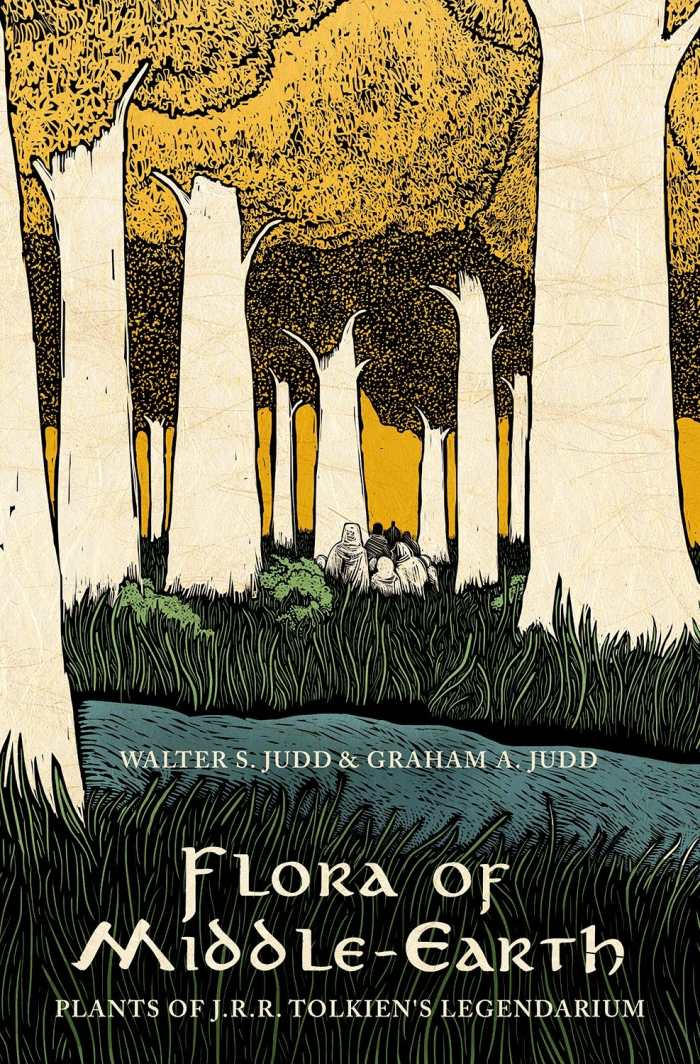
Walter S. Judd
Graham A. Judd
Oxford University Press
Hardcover $34.95 (416pp)
978-0-19-027631-7
Buy: Local Bookstore (Bookshop), Amazon
Flora of Middle-Earth resides at the intersection of the mundane and the fantastical.
An ambitious labor of love, Flora of Middle-Earth: Plants of J. R. R. Tolkien’s Legendarium, by Walter S. Judd and Graham A. Judd, marries science and art to illuminate the depth and breadth of the botanical underpinnings of J. R. R. Tolkien’s works.
With painstaking care, this father-and-son duo examine Tolkien as environmentalist, displaying the extent to which Tolkien designed his mythos—down to the plant life. The authors insist that his affinity for the flora of Middle-Earth went beyond a novelist adding realistic window dressing to his imaginative world, and that Tolkien fully embraced his role as subcreator.
The book shows that Tolkien’s Roman Catholic convictions related to a benevolent creator God and to the idea that humans possess something of the God-image themselves—enough to partner in God’s creativity. Therefore the smallest details would have mattered to Tolkien, who sought to tie Middle-Earth to our own sphere. His works, the book says, should elicit serious engagement with the world around us, particularly in ecological regards.
The research here is extensive and fascinating. Different regions of Middle-Earth are compared with their ecological counterparts on Earth. The largest section of the book treats the plants of Tolkien’s legendarium individually, including quotes from the major works. It offers a literary analysis of plants’ roles in the mythos, their physical descriptions, and etymological dissections of their names.
A crash course in plant biology is offered, and while it certainly suffices as an introduction of terms and nomenclature, there are plenty of resources suggested for further study. Scholars, longtime fans, and newcomers alike will find much here to sate their appetites.
Graham Judd’s illustrations are intricate and lovely, and their style harmonizes perfectly with their subjects. Eschewing more modern artistic trends and photographic representations, he achieves the look of relief carvings through digital magic. He pays homage to Tolkien the illustrator, as well as to the great tradition of other Tolkien illustrators, especially Alan Lee. The result is both informative and aesthetically pleasing.
Flora of Middle-Earth resides at the intersection of the mundane and the fantastical, bidding the scales to fall from humanity’s plant-blind eyes so that, with Tolkien as guide, we may once again awaken to our symbiosis with complex, beautiful nature.
MEAGAN LOGSDON (July 27, 2017)
The Long Weeping’s collection of essays is quietly gorgeous. Christian mysticism, rustic West Virginia, and an exploration of the Hebrew character, Rizpah, cultivate a longing for the divine that is both earthy and esoteric. —Meagan Logsdon
The Long Weeping
Portrait Essays
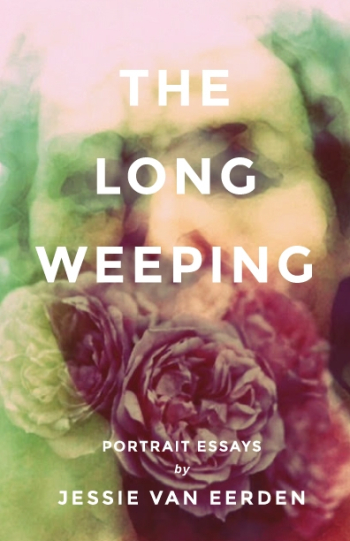
Jessie van Eerden
Orison Books
Softcover $18.00 (196pp)
978-0-9964397-5-6
Buy: Local Bookstore (Bookshop), Amazon
The essays in The Long Weeping traverse the full range of human experiences with grace.
The Long Weeping, by Jessie van Eerden, hums with lyricism and insights that reach to the essence of life, grief, and the soul.
These essays are sewn together by their common embrace of a deep spirituality, even in the midst of chaotic everyday life. Exemplified primarily by the feminine Beguines and by Simone Weil, Christian mysticism runs through the book.
The body, including its tumultuous emotions, is seen as being as important and sacred as the nebulous spirit. It is only through successful integration of body and spirit, van Eerden suggests, that true healing can occur and resolve can flower.
This is most clearly conveyed in the collection’s culmination—a lengthy portrayal of Rizpah, a concubine to Saul and the mother of sons who were killed by David when he ascended to the throne. She functions as a mirror for the soul, and shepherds the audience through the stages of grief.
Modern touches include references to job interviews, grocery stores, and hotels, with a wealth of material gleaned from a small portion of the biblical text. Van Eerden partners with scriptures lovingly, allowing them to sing for themselves.
Prose is tenderly poetic, and the presence of details from the author’s own life prevent obfuscation. Van Eerden often juxtaposes the gritty and simple reality of rural West Virginia’s poor with beautiful metaphysical insights, creating self-examining, autobiographical essays with a steady religious undertone.
Van Eerden’s fundamentalist religious upbringing is recognized, not despised, as a vital part of her past, even as she moves into larger spiritual circles. Humility, warmth, and charm underscore the collection’s darker brushes with death, divorce, and self-doubt. Essays extend an invitation to peer through van Eerden’s particular window, which reveals the commonality of humanity despite differing circumstances.
Traversing the full range of human experiences with grace, The Long Weeping insists that solace awaits on the other side of even the blackest tumult, if only it can be perceived and grasped.
MEAGAN LOGSDON (August 27, 2017)
Ullman draws on his long career as a foreign policy advisor to presidents in this impressive investigation of US foreign policy since the second half of the twentieth century. Presidential diplomacy has largely failed due to a lack of successful strategic planning. Only President George H.W. Bush effectively implemented realistic goals based on detailed assessment, which resulted in a quick victory in the 1991 Iraq War. This important appraisal is full of lessons for presidents and diplomats who are willing to listen. —Karl Helicher
Anatomy of Failure
Why America Loses Every War it Starts
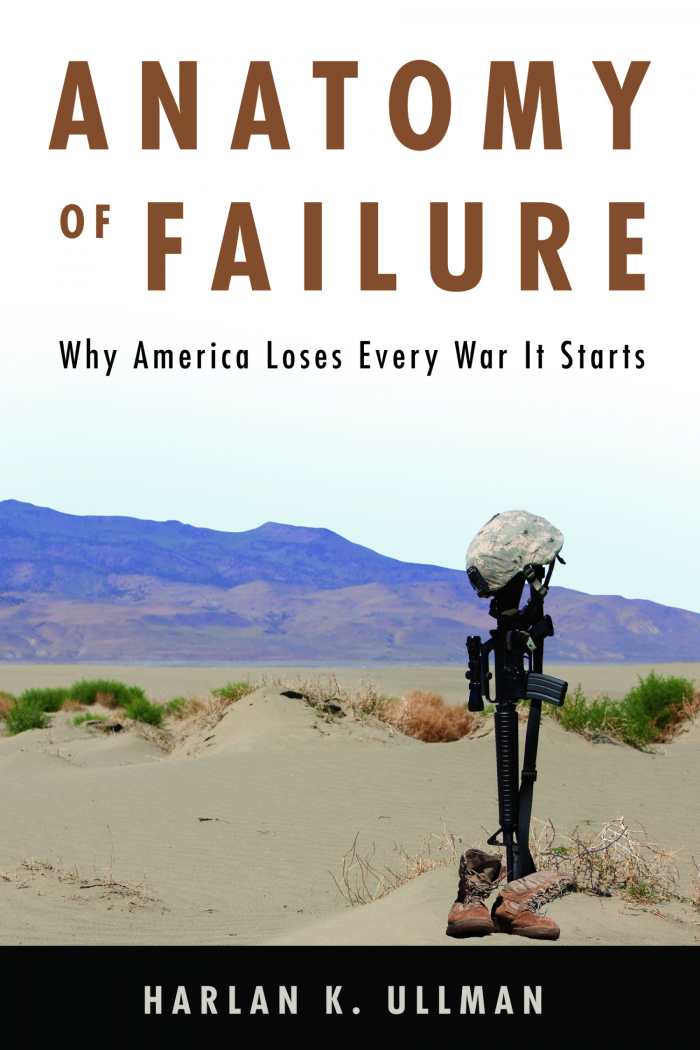
Harlan Ullman
Naval Institute Press
Hardcover $29.95 (272pp)
978-1-68247-225-5
Buy: Local Bookstore (Bookshop), Amazon
This comprehensive investigation reveals the complexities of foreign-policy making in the era of “no world order.”
Anatomy of Failure is Harlan Ullman’s enlightening assessment of the United States’s bleak record of losing all the wars it started since the second half of the twentieth century. The book demonstrates that a lack of knowledge about diplomatic history and ineffective strategic planning have caused presidents from John F. Kennedy to Donald Trump to inflame existing crises or spark new ones.
This richly detailed account reflects Ullman’s distinguished career as a swift-boat commander during the Vietnam War, through to his decades as an expert advisor to presidents and political officials, as well as his tenure as a foreign-policy scholar.
Each president’s record is thoroughly scrutinized, and only George H. W. Bush ends up being lauded for his planning and realistic goals; they led to a quick US victory in the 1991 Iraq War. Conversely, his son, George W. Bush, is indicted for blundering into the 2003 Iraq War in order to justify never-found weapons of mass destruction, in what Ullman calls “strategic incompetence of the highest order.”
Bush’s successor, Barack Obama, is criticized for a line-in-the-sand challenge to Syria’s Assad over his use of chemical weapons—a decree that was ignored by Syria and, Ullman says, resulted in diminished American credibility. President Trump, according to Ullman, is off to an inauspicious start; Twitter rants have worsened relations with North Korea, other enemies, and allies.
The book’s outstanding feature is its inclusion of dialogues among the author and presidents and members of the foreign-policy complex. Ullman is not afraid to mince words; he offers well-researched assessments that discomfort cliché-spouting authorities.
This comprehensive investigation reveals the complexities of foreign-policy making in the era of “no world order.” Ullman warns that the continued absence of strategic planning, coupled with the failure to understand the mind-sets of other nations’ leaders, will result in worsening relations and increased conflicts. This is an important book for presidents, officials, and citizens concerned about America’s evolving role in the world.
KARL HELICHER (October 27, 2017)
Shieffer, who has hosted CBS’s popular Face the Nation for four decades turns his attention to the 2016 US presidential election and the importance of social media in providing real and fake news 24/7. This bleak, cautionary overview reveals and discusses lessons from the election and proposes much needed reforms to a political system caught in a downward spiral. —Karl Helicher
Overload
Finding the Truth in Today’s Deluge of News
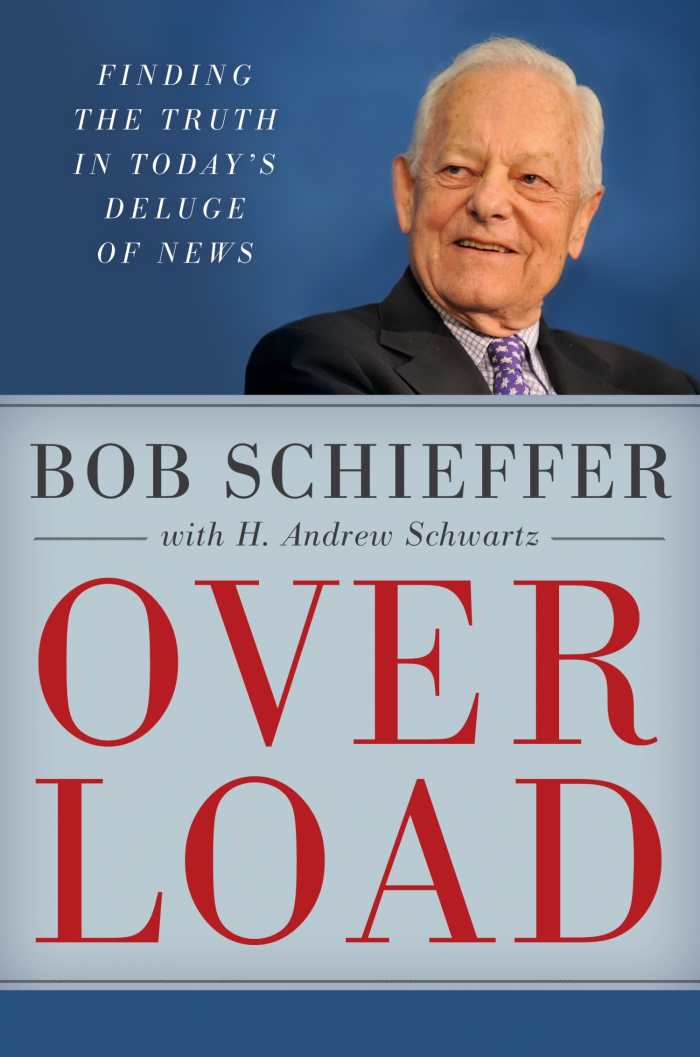
Bob Schieffer
H. Andrew Schwartz, contributor
Rowman & Littlefield
Hardcover $24.95 (190pp)
978-1-5381-0721-8
Buy: Local Bookstore (Bookshop), Amazon
In this incisive work, a veteran newsman explores modern media and why we have become so vulnerable to “alternative facts.”
Overload is news veteran Bob Schieffer’s insightful take on modern journalism, presented with the able assistance of H. Andrew Schwartz of the Center for Strategic and International Studies.
Schieffer enjoyed a sixty-year career in journalism, including forty years with CBS, where he hosted the popular news show Face the Nation. Schwartz contributes three chapters on how technology is revolutionizing media industries.
In addition to its state-of-the-art investigation of modern journalism, the book includes Schieffer’s post-mortem on the 2016 presidential election, a race that discarded the traditional rules of political decorum.
Schieffer says the most frequent question he was asked about 2016 was why the choice came down to these two candidates. Charges of fake news and the reality of sloppy polling, the book claims, contributed to Donald Trump’s surprise victory. Although Trump’s use of Twitter infuriated his opponents, it resonated with and coalesced his supporters.
Much of the book describes how media outlets are evolving to meet the political information demands of their users. More than 80 percent of millennials––the largest consumers of news—turn to online sources for political updates, he reveals, and 62 percent of all news consumers receive their information from social media. Such outlets, he shows, are vulnerable to the viral spread of “alternative facts.”
The most fascinating chapters include Schieffer’s interviews with Martin Baron, editor of the Washington Post, and with Elisabeth Bumiller, the New York Times Washington bureau chief, who both relate how their respective newspapers have become 24/7 digital services. The Post, according to Baron, has made its website the priority over the print edition, transforming it into a truly national online digital service.
The book concludes with a discussion of the important lessons the authors learned during the past year, such as that digital information overwhelms users, that new ways of accurate polling must be identified, and that local newspapers, which once kept local politicians honest, will continue to fold. The electoral system, corrupted by excessive funding and gerrymandering, must also be overhauled, it declares.
Despite major challenges to media outlets, Schieffer’s tone remains upbeat about journalism’s future. This book is an important guide that has much to offer to those in media and journalism, as well as to concerned citizens.
KARL HELICHER (August 10, 2017)
This novelistic business book traces the rise and spectacular fall of an Israeli tech company, Better Place. The riveting story offers a portrait of a visionary antihero as compelling as any found in a technology thriller. —Barry Silverstein
Totaled
The Billion-Dollar Crash of the Startup that Took on Big Auto, Big Oil and the World
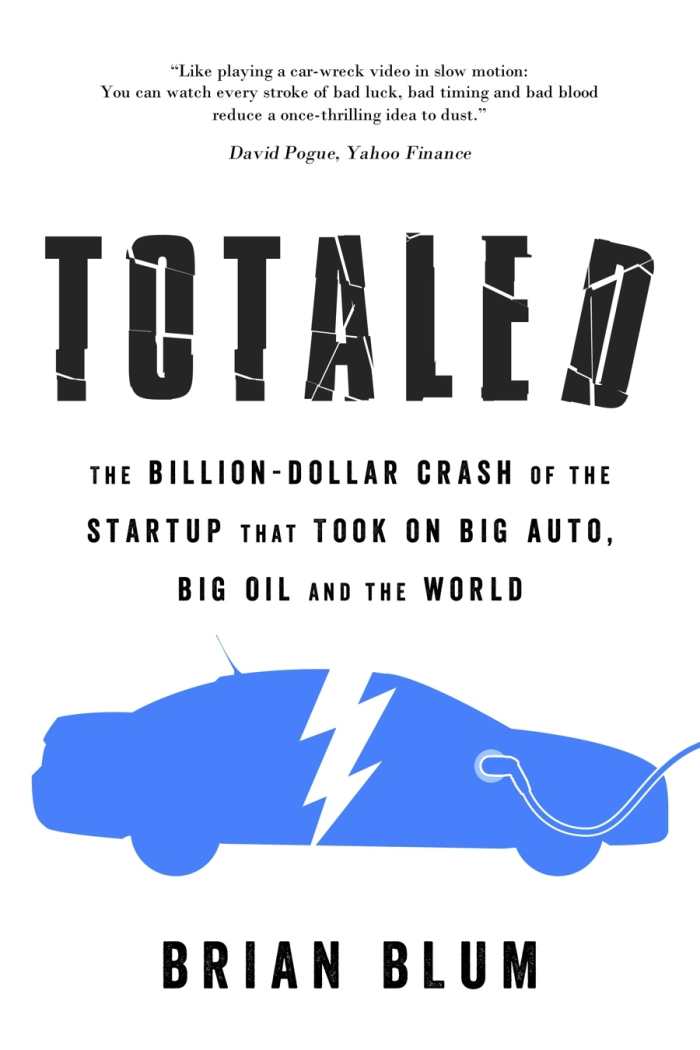
Brian Blum
Blue Pepper Press
Softcover $17.99 (358pp)
978-0-9830428-1-5
Buy: Local Bookstore (Bookshop), Amazon
Brian Blum, a technology journalist, characterizes the Israeli company Better Place as “perhaps the most spectacularly failed technology startup of the 21st century” in his novel-like business story, Totaled.
Blum tells the tale of the irrepressible, charismatic Shai Agassi, who started Better Place in 2007 with a unique if somewhat implausible goal: to reduce the world’s dependency on oil by creating electric cars with batteries that would be switched out by robots rather than recharged.
In a book that breathlessly relates the wild ride of a startup whose audacious goal far outpaced its ability to deliver, Blum masterfully traces the rise, evolution, and eventual fall of Better Place. While it introduces numerous players, its most intimate look is at the visionary Agassi—as compelling an antihero as found in any technology thriller.
It is Agassi who charms major international investors and national leaders, including Israeli president Shimon Peres, negotiating a partnership with Renault to build the electric car needed to turn his improbable idea into reality.
The book’s as-it-happens narrative makes for riveting reading. Given the very current interest in climate change, Totaled is all the more compellingly relevant, as it uncovers the technological difficulty of developing potential solutions to the world’s most serious challenge.
It is fascinating to witness a promising, well-funded company fall prey to hubris, poor execution, and economic calamity. Blum’s insightful seven lessons at the end of the book offer valuable cautionary advice for startups.
BARRY SILVERSTEIN (August 27, 2017)
Matt Sutherland
